PM says Pakistan to privatize all state-owned entities except ‘strategically important’ ones
KARACHI: Prime Minister Shehbaz Sharif announced on Tuesday that his government would privatize all state-owned enterprises (SOEs) except for those deemed “strategically important” or essential ones, state-owned media reported, as Islamabad looks to overhaul its public entities to improve their performance.
The announcement is in direct conflict with Finance Minister Muhammad Aurangzeb’s statement from Sunday in which he said that all public entities would be handed over to the private sector. The minister had said he and Deputy Prime Minister Ishaq Dar were on the same page that “there is no such thing as a strategic SOE.”
Former finance minister Dar had chaired a meeting of the Cabinet Committee on Privatization on May 10 in which he had said the government’s business would only be limited to essential or strategic SOEs. Dar said while priority would be accorded to loss-making entities, even SOEs who were earning profits would be considered for privatization.
PM Sharif chaired a high-level meeting on matters related to the Ministry of Privatization and Privatization Commission on Tuesday, the state-run Radio Pakistan reported.
“Prime Minister Shehbaz Sharif has announced to privatize all government-owned enterprises with the exception of strategically important state-owned enterprises,” Radio Pakistan said. “The Prime Minister directed all federal ministries to take necessary action in this regard and cooperate with the Privatization Commission.”
Pakistan’s Finance Division has defined strategic entities as those whose functions have significant strategic, security, or social importance in addition to economic values for the country. It has defined essential SOEs as those which are critical for the execution of government policies and where the private sector is unable to assume those functions due to various reasons.
The Oil & Gas Development Limited (OGDCL), Pakistan State Oil (PSO), National Bank of Pakistan, and hydropower projects are considered strategically important enterprises owned by the government. However, the government has not classified strategic assets for privatization yet.
Pakistan agreed to overhaul its public entities under a $3 billion financial bailout agreement it signed with the International Monetary Fund (IMF) last year, a deal that helped it avert a sovereign debt default in 2023. The IMF has said Pakistan’s SOEs whose losses are burning a hole in government finances would need stronger governance. Pakistan is currently negotiating with the international lender for a larger, longer program for which it must implement an ambitious reforms agenda, including the privatization of debt-ridden SOEs.
Among the main entities Pakistan is pushing to privatize is its national flag carrier, the Pakistan International Airlines (PIA). The government is putting on the block a stake ranging from 51 percent to 100 percent.
Sharif instructed authorities to ensure transparency in the privatization process of all state-owned entities, including the PIA.
“He directed to televise live Pakistan International Airlines Company Limited’s privatization including bidding and other important steps,” Radio Pakistan said. “The process of privatization of other institutions will also be broadcast live.”
The prime minister was informed that the pre-qualification process for PIA’s privatization would be completed by the end of May. He was told loss-making SOEs would be privatized on priority and that a “pre-qualified panel of experts” is being appointed in Pakistan’s Privatization Commission to speed up the process.
Separately, Aurangzeb chaired a meeting of the Cabinet Committee on State-Owned Enterprises on Monday which was attended by ministers of maritime affairs, economic affairs, housing and works, the governor of Pakistan’s central bank and other officials. The meeting was held to evaluate the performance of the country’s public entities and review the progress of the government’s privatization agenda.
Aurangzeb directed concerned ministries and divisions to submit proposals for the categorization of their respective public entities by May 20. The step is aimed at reviewing the rationale for retaining any commercial functions within the public sector, the finance ministry said.
“The objective is to retain only the essential functions within the public sector & to assign the remaining functions to the private sector,” it said. “At the same time the entities which remain in public sector have to be more competitive, accountable, and responsive to the needs of citizens.”
Participants agreed to foster transparency, efficiency, and sustainable growth within the SOEs, reflecting the government’s dedication to ensuring the optimal utilization of public resources, the ministry said.
Tahir Abbas, the head of research at Arif Habib Limited, considered Pakistan’s largest securities brokerage company, said the conflicting statements between Sharif and Aurangzeb showed lack of coordination between them.
“There seems lack of coordination between them on the classification of assets for privatization,” he told Arab News.

